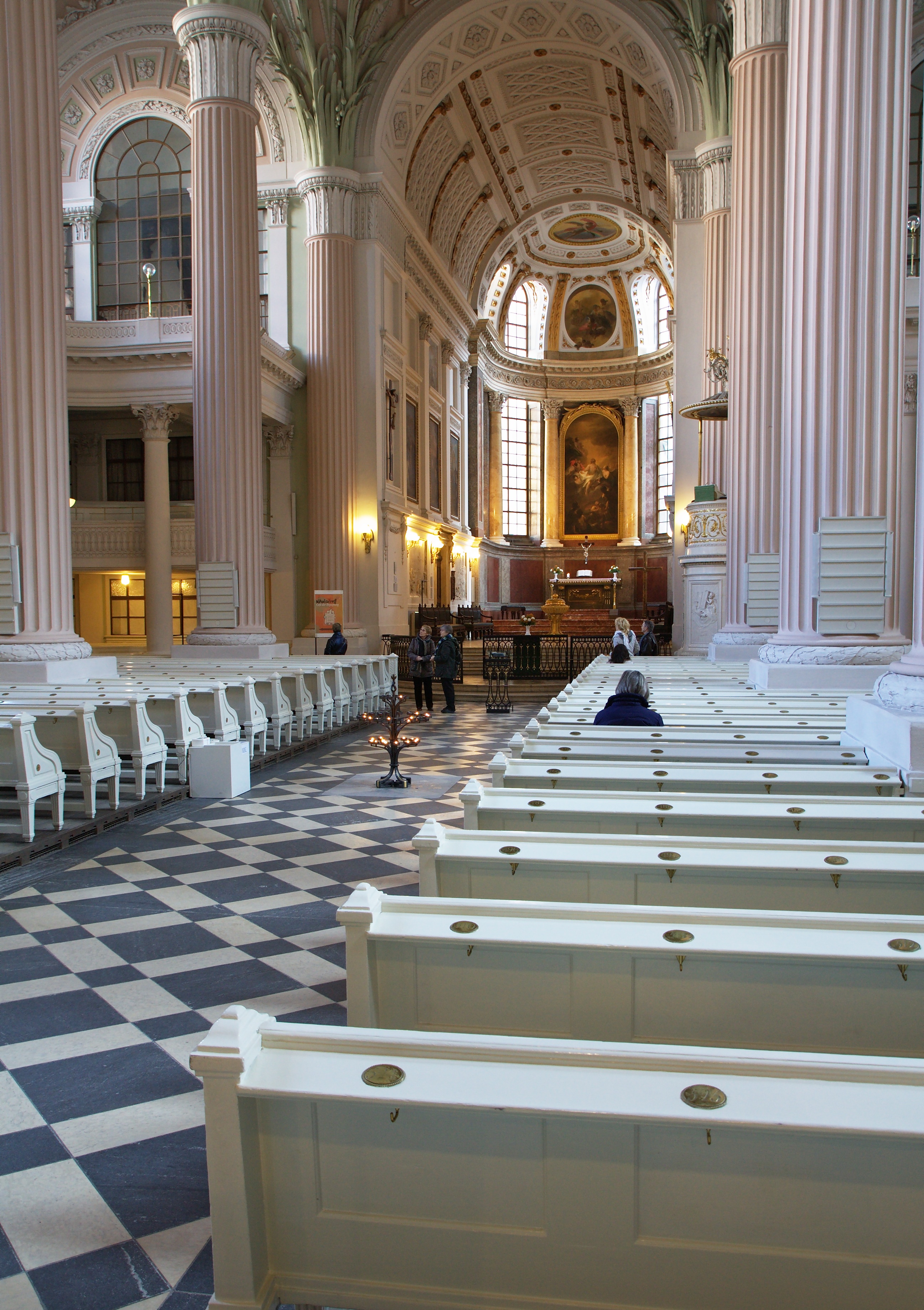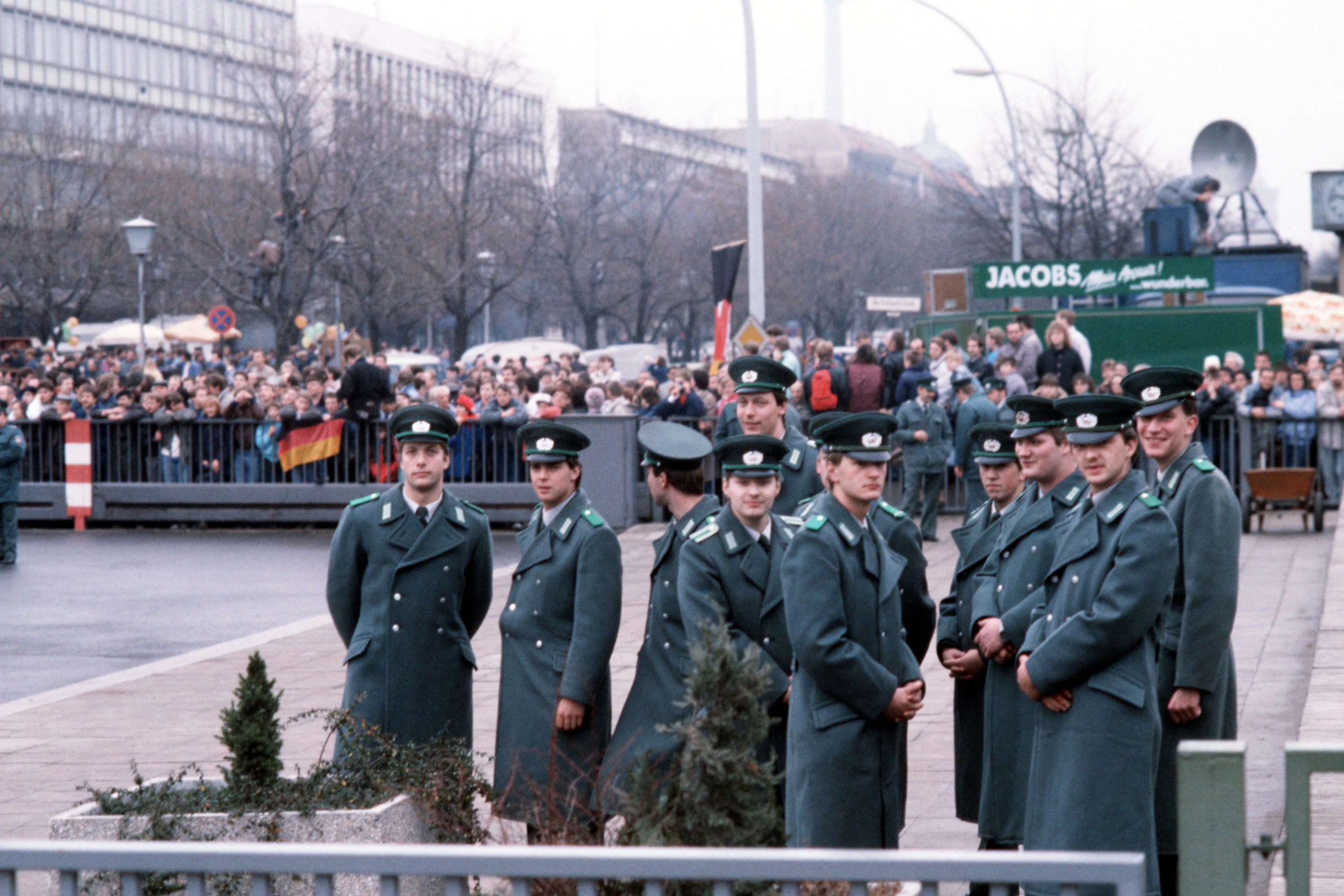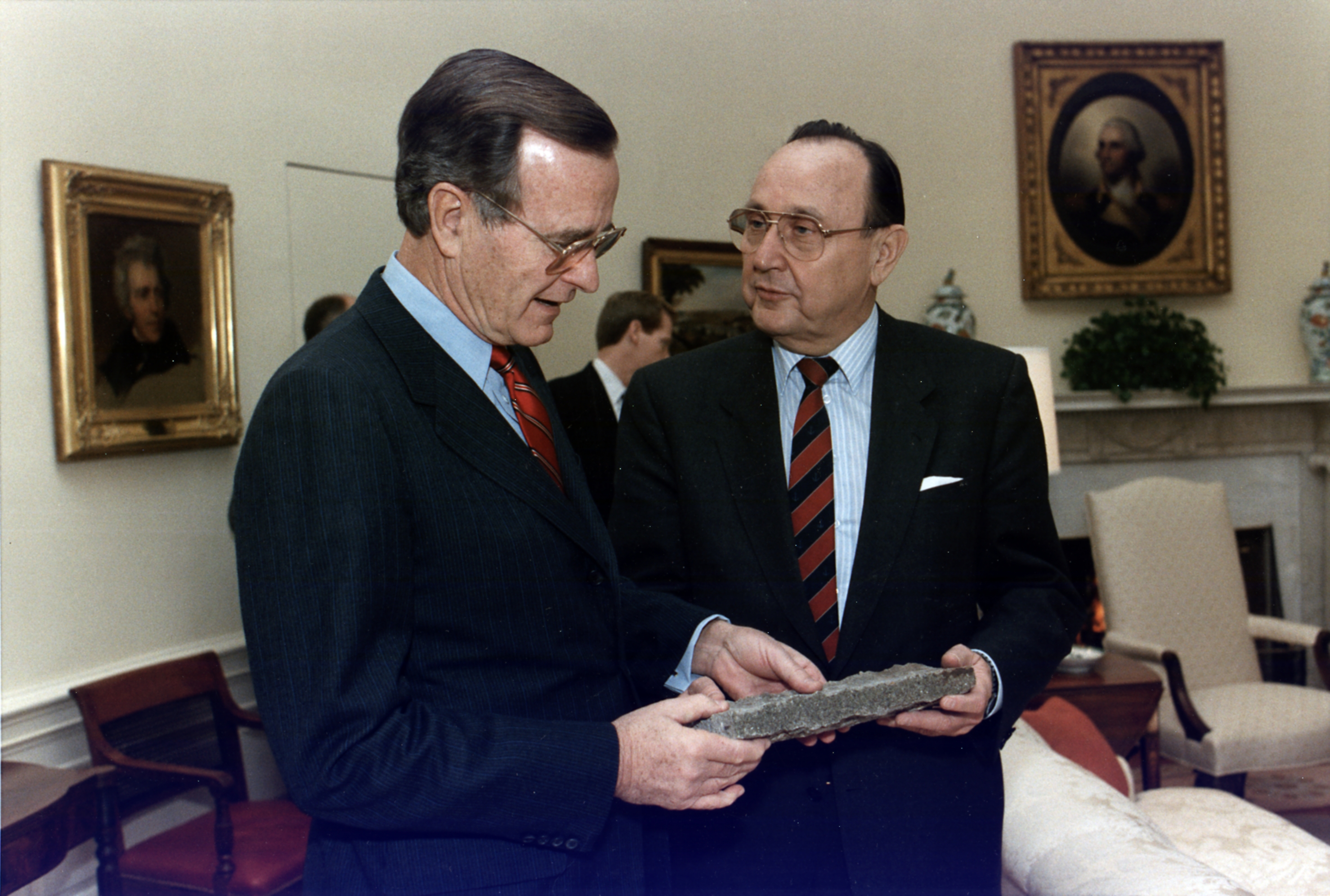|
Monday Demonstrations In East Germany
The Monday demonstrations () were a series of peaceful political protests against the government of the German Democratic Republic (GDR). The demonstrations began in Leipzig on 4 September 1989, starting the Peaceful Revolution in the GDR: the fall of the Berlin Wall, the collapse of the government, and German reunification. The demonstrations took place in towns and cities around the GDR on various days of the week from 1989 to 1991. The Leipzig demonstrations, which are the best known, took place on Mondays. The protests are conventionally separated into five cycles. Overview Despite the policy of state atheism in East Germany, the demonstrations grew out of Christian prayer, prayers for peace held in St. Nicholas Church, Leipzig, St. Nicholas Church in Leipzig from 1982 onward. The prayer meetings began on September 20, 1982 by pastor , continued in 1986 by pastor , and then continued on October 30, 1989 by pastor Christian Führer. On 4 September 1989, after the prayer ... [...More Info...] [...Related Items...] OR: [Wikipedia] [Google] [Baidu] |
Bundesarchiv Bild 183-1989-1106-405, Plauen, Demonstration Vor Dem Rathaus
The German Federal Archives or Bundesarchiv (BArch) (, lit. "Federal Archive") are the national archives of Germany. They were established at the current location in Koblenz in 1952. They are subordinated to the Federal Commissioner for Culture and the Media (Claudia Roth since 2021) under the German Chancellery, and before 1998, to the Federal Ministry of the Interior (Germany), Federal Ministry of the Interior. On 6 December 2008, the Archives donated 100,000 photos to the public, by making them accessible via Wikimedia Commons. History The federal archive for institutions and authorities in Germany, the first precursor to the present-day Federal Archives, was established in Potsdam, Brandenburg in 1919, a later date than in other European countries. This national archive documented German government dating from the founding of the North German Confederation in 1867. It also included material from the older German Confederation and the Imperial Chamber Court. The oldest docum ... [...More Info...] [...Related Items...] OR: [Wikipedia] [Google] [Baidu] |
Freedom To Move
Freedom of movement, mobility rights, or the right to travel is a human rights concept encompassing the right of individuals to travel from place to place within the territory of a country,Jérémiee Gilbert, ''Nomadic Peoples and Human Rights'' (2014), p. 73: "Freedom of movement within a country encompasses both the right to travel freely within the territory of the State and the right to relocate oneself and to choose one's place of residence". and to leave the country and return to it. The right includes not only visiting places, but changing the place where the individual resides or works.Kees Groenendijk, Elspeth Guild, and Sergio Carrera, ''Illiberal Liberal States: Immigration, Citizenship and Integration in the EU'' (2013), p. 206: " eedom of movement did not only amount to the right to travel freely, to take up residence and to work, but also involved the enjoyment of a legal status characterised by security of residence, the right to family reunification and the right ... [...More Info...] [...Related Items...] OR: [Wikipedia] [Google] [Baidu] |
Egon Krenz
Egon Rudi Ernst Krenz (; born 19 March 1937) is a German former politician who was the last Communist leader of the German Democratic Republic (East Germany) during the Revolutions of 1989. He succeeded Erich Honecker as the Secretary (title), General Secretary of the ruling Socialist Unity Party of Germany (SED) but was forced to resign only weeks later when the Berlin Wall fell. Throughout his career, Krenz held a number of prominent positions in the SED. He was Honecker's deputy from 1984 until he succeeded him in 1989 amid protests against the regime. Krenz was unsuccessful in his attempt to retain the Communist regime's grip on power. The SED gave up its monopoly of power some weeks after the fall of the Berlin Wall, and Krenz was forced to resign shortly afterward. He was expelled from the Party of Democratic Socialism (Germany), SED's successor party on 21 January 1990. In 2000, he was sentenced to six and a half years in prison for manslaughter for his role in the Commu ... [...More Info...] [...Related Items...] OR: [Wikipedia] [Google] [Baidu] |
Socialist Unity Party Of Germany
The Socialist Unity Party of Germany (, ; SED, ) was the founding and ruling party of the German Democratic Republic (East Germany) from the country's foundation in 1949 until its dissolution after the Peaceful Revolution in 1989. It was a Marxism–Leninism, Marxist–Leninist communist party, established in 1946 as a Merger of the Communist Party of Germany and the Social Democratic Party of Germany, merger of the East German branches of the Communist Party of Germany and Social Democratic Party of Germany. The German Democratic Republic (GDR) was effectively a one-party state. Other institutional Popular front, popular front parties were permitted to exist in alliance with the SED; these parties included the Christian Democratic Union (East Germany), Christian Democratic Union, the Liberal Democratic Party of Germany, Liberal Democratic Party, the Democratic Farmers' Party of Germany, Democratic Farmers' Party, and the National Democratic Party of Germany (East Germany), Nat ... [...More Info...] [...Related Items...] OR: [Wikipedia] [Google] [Baidu] |
Chant
A chant (from French ', from Latin ', "to sing") is the iterative speaking or singing of words or sounds, often primarily on one or two main pitches called reciting tones. Chants may range from a simple melody involving a limited set of notes to highly complex musical structures, often including a great deal of repetition of musical subphrases, such as Great Responsories and Offertories of Gregorian chant. Chant may be considered speech, music, or a heightened or stylized form of speech. In the Late Middle Ages, some religious chant evolved into song (forming one of the roots of later Western music). Chant as a spiritual practice Chanting (e.g., mantra, sacred text, the name of God/Spirit, etc.) is a commonly used spiritual practice. Like prayer, chanting may be a component of either personal or group practice. Diverse spiritual traditions consider chant a route to spiritual development. Some examples include chant in African, Hawaiian, Native American, Assyri ... [...More Info...] [...Related Items...] OR: [Wikipedia] [Google] [Baidu] |
Kurt Masur
Kurt Masur (; 18 July 192719 December 2015) was a German Conducting, conductor. Called "one of the last old-style maestros", he directed many of the principal orchestras of his era. He had a long career as the Kapellmeister of the Leipzig Gewandhaus Orchestra, and also served as music director of the New York Philharmonic for about ten years. He made many recordings of classical music with major orchestras. Masur is also remembered for his actions to support peaceful demonstrations against the East German government in the Monday demonstrations in East Germany, 1989 demonstrations in Leipzig; those protests were part of the events leading up to the Berlin Wall#Fall of the Berlin Wall, fall of the Berlin wall. Biography Masur was born in Brzeg, Brieg, Province of Lower Silesia, Lower Silesia, Weimar Republic, Germany (now Brzeg, Poland), and studied piano, composition and conducting in Leipzig, Saxony. His father was an electrical engineer, and as a young boy he completed an elec ... [...More Info...] [...Related Items...] OR: [Wikipedia] [Google] [Baidu] |
Tiananmen Square Massacre
The Tiananmen Square protests, known within China as the June Fourth Incident, were student-led demonstrations held in Tiananmen Square in Beijing, China, lasting from 15 April to 4 June 1989. After weeks of unsuccessful attempts between the demonstrators and the Chinese government to find a peaceful resolution, the Chinese government deployed troops to occupy the square on the night of 3 June in what is referred to as the Tiananmen Square massacre. The events are sometimes called the '89 Democracy Movement, the Tiananmen Square Incident, or the Tiananmen uprising. The protests were precipitated by the death of pro-reform Chinese Communist Party (CCP) general secretary Hu Yaobang in April 1989 amid the backdrop of rapid economic development and social change in post-Mao China, reflecting anxieties among the people and political elite about the country's future. The reforms of the 1980s had led to a nascent market economy that benefited some people but seriously disadvant ... [...More Info...] [...Related Items...] OR: [Wikipedia] [Google] [Baidu] |
National People's Army
The National People's Army (, ; NVA ) were the armed forces of the East Germany, German Democratic Republic (DDR) from 1956 until 1990. The NVA was organized into four branches: the (Ground Forces), the (Navy), the (Air Force) and the (Border Troops). The NVA belonged to the Ministry of National Defence (East Germany), Ministry of National Defence and commanded by the National Defense Council of East Germany, which was headquartered in Strausberg - east of East Berlin. From 1962, conscription was mandatory for all DDR males aged between 18 and 60 requiring an 18-month service, and it was the only Warsaw Pact military to offer non-combat roles to conscientious objectors, known as "construction soldiers" (). The NVA reached 175,300 personnel at its peak in 1987. The NVA was formed on 1 March 1956 to succeed the (Barracked People's Police) and under the influence of the Soviet Army became one of the Warsaw Pact militaries opposing NATO during the Cold War. The majority of NAT ... [...More Info...] [...Related Items...] OR: [Wikipedia] [Google] [Baidu] |
Volkspolizei
The (DVP, German for "German People's Police"), commonly known as the or VoPo, was the national uniformed police force of the German Democratic Republic (East Germany) from 1945 to 1990. The Volkspolizei was a highly- centralized agency responsible for most civilian law enforcement in East Germany, maintaining roughly 257,500 personnel at its peak. It worked closely along with the Stasi to maintain public order and identify threats to the government. History The was effectively founded in June 1945 when the Soviet Military Administration in Germany (SVAG) established central police forces in the regions of Nazi Germany it occupied following after World War II. The SVAG approved the arming of community-level police forces on 31 October 1945, but remained a non-militarised force, and by 1946 the comprised some 22,000 personnel. The police force experienced several challenges at this time: the proportion of non-trained personnel between 65 and 95% undermined its profes ... [...More Info...] [...Related Items...] OR: [Wikipedia] [Google] [Baidu] |
Dresden
Dresden (; ; Upper Saxon German, Upper Saxon: ''Dräsdn''; , ) is the capital city of the States of Germany, German state of Saxony and its second most populous city after Leipzig. It is the List of cities in Germany by population, 12th most populous city of Germany, the fourth largest by area (after Berlin, Hamburg, and Cologne), and the third-most populous city in the area of former East Germany, after Berlin and Leipzig. Dresden's urban area comprises the towns of Freital, Pirna, Radebeul, Meissen, Coswig, Saxony, Coswig, Radeberg, and Heidenau and has around 790,000 inhabitants. The Dresden metropolitan area has approximately 1.34 million inhabitants. Dresden is the second largest city on the River Elbe after Hamburg. Most of the city's population lives in the Dresden Basin, Elbe Valley, but a large, albeit very sparsely populated, area of the city east of the Elbe lies in the West Lusatian Hill Country and Uplands (the westernmost part of the Sudetes) and thus in Lusatia. ... [...More Info...] [...Related Items...] OR: [Wikipedia] [Google] [Baidu] |
Hans-Dietrich Genscher
Hans-Dietrich Genscher (21 March 1927 – 31 March 2016) was a German statesman and a member of the liberal Free Democratic Party (FDP), who served as Federal Minister of the Interior from 1969 to 1974, and as Federal Minister for Foreign Affairs and Vice Chancellor of Germany from 1974 to 1992 (except for a two-week break in 1982, after the FDP had left the Third Schmidt cabinet), making him the longest-serving occupant of either post and the only person to have held one of these positions under two different Chancellors of the Federal Republic of Germany. In 1991 he was chairman of the Organization for Security and Co-operation in Europe (OSCE). A proponent of Realpolitik, Genscher has been called "a master of diplomacy". He is widely regarded as having been a principal "architect of German reunification". In 1991, he played a pivotal role in international diplomacy surrounding the breakup of Yugoslavia by successfully pushing for international recognition of Croatia, Slove ... [...More Info...] [...Related Items...] OR: [Wikipedia] [Google] [Baidu] |







